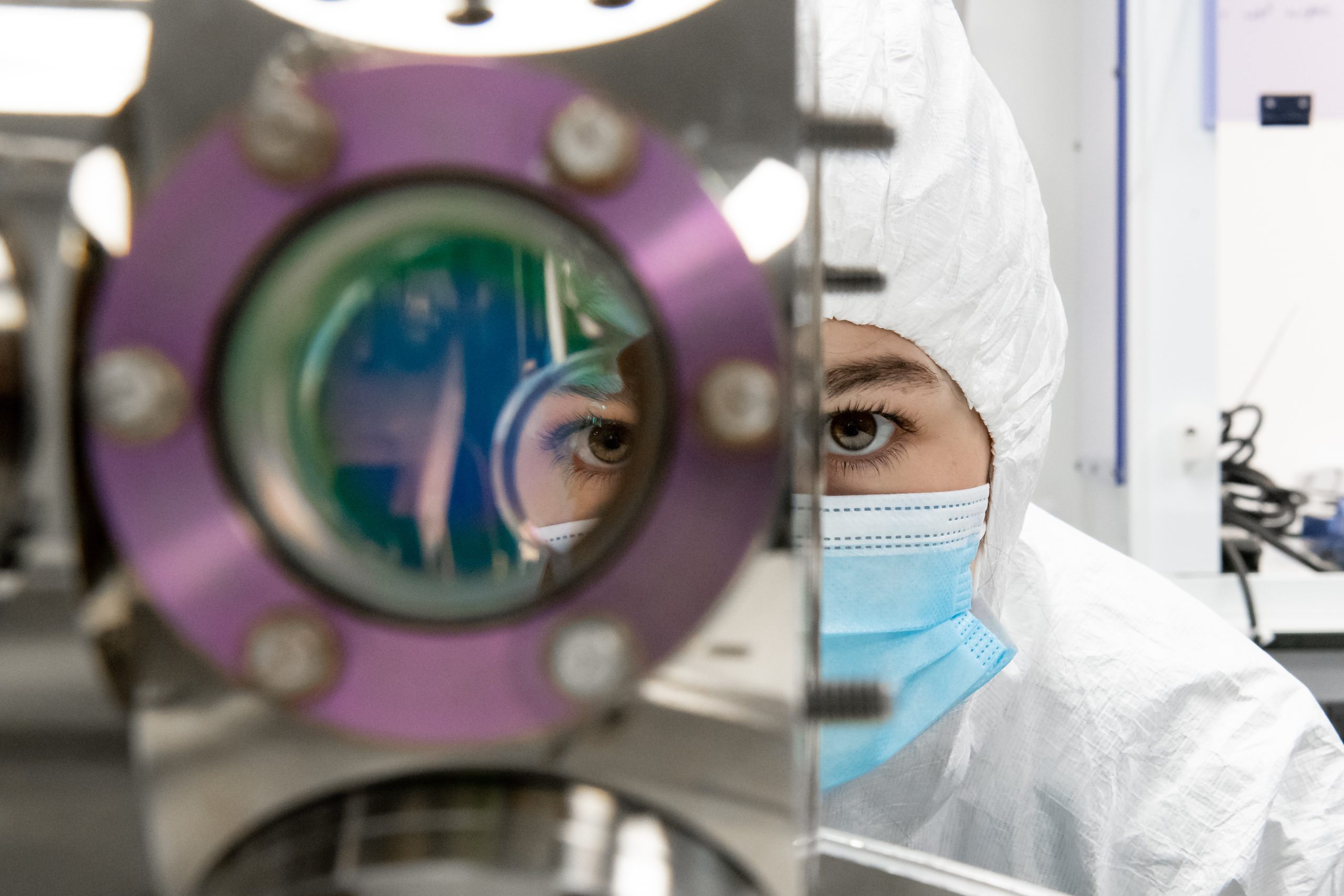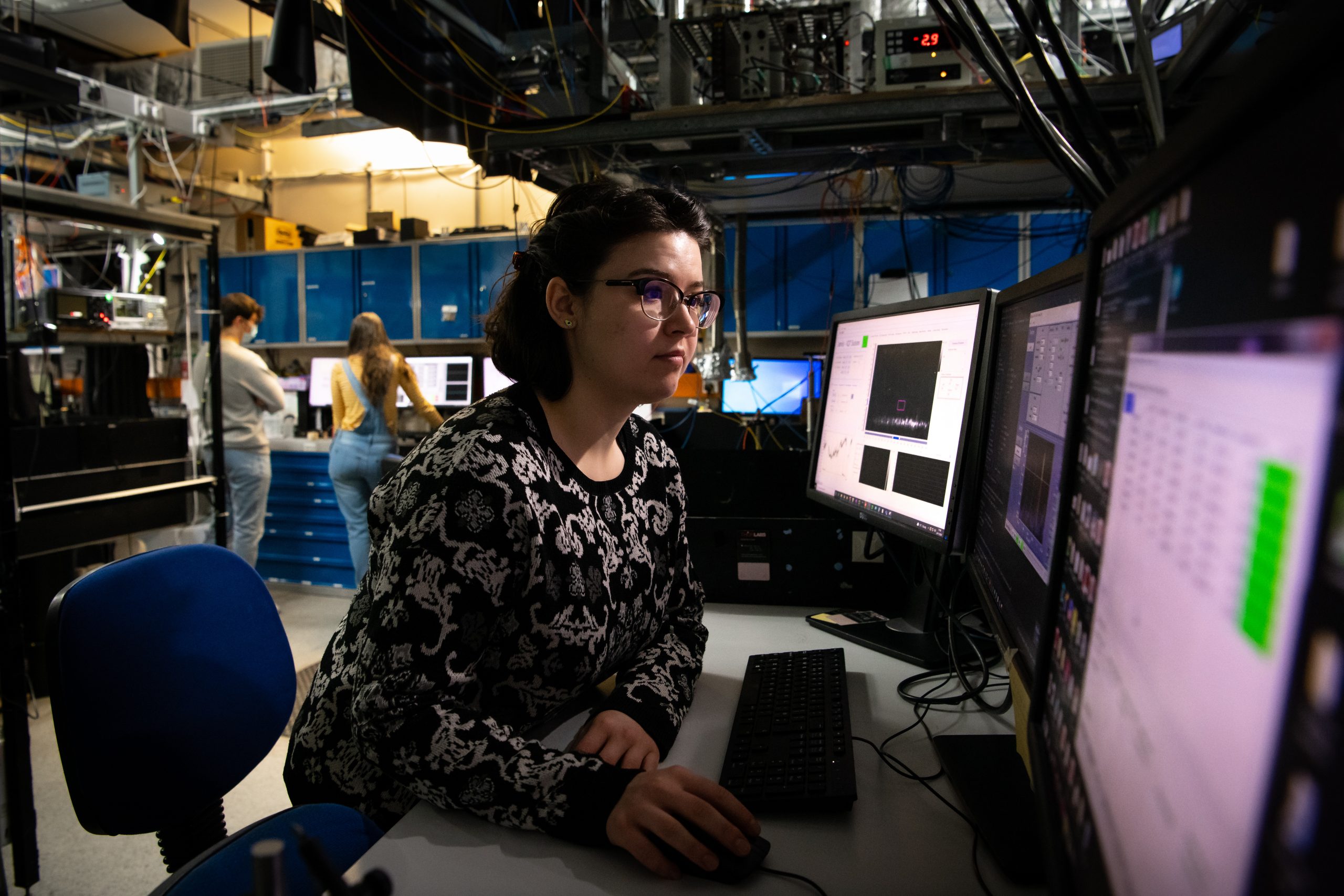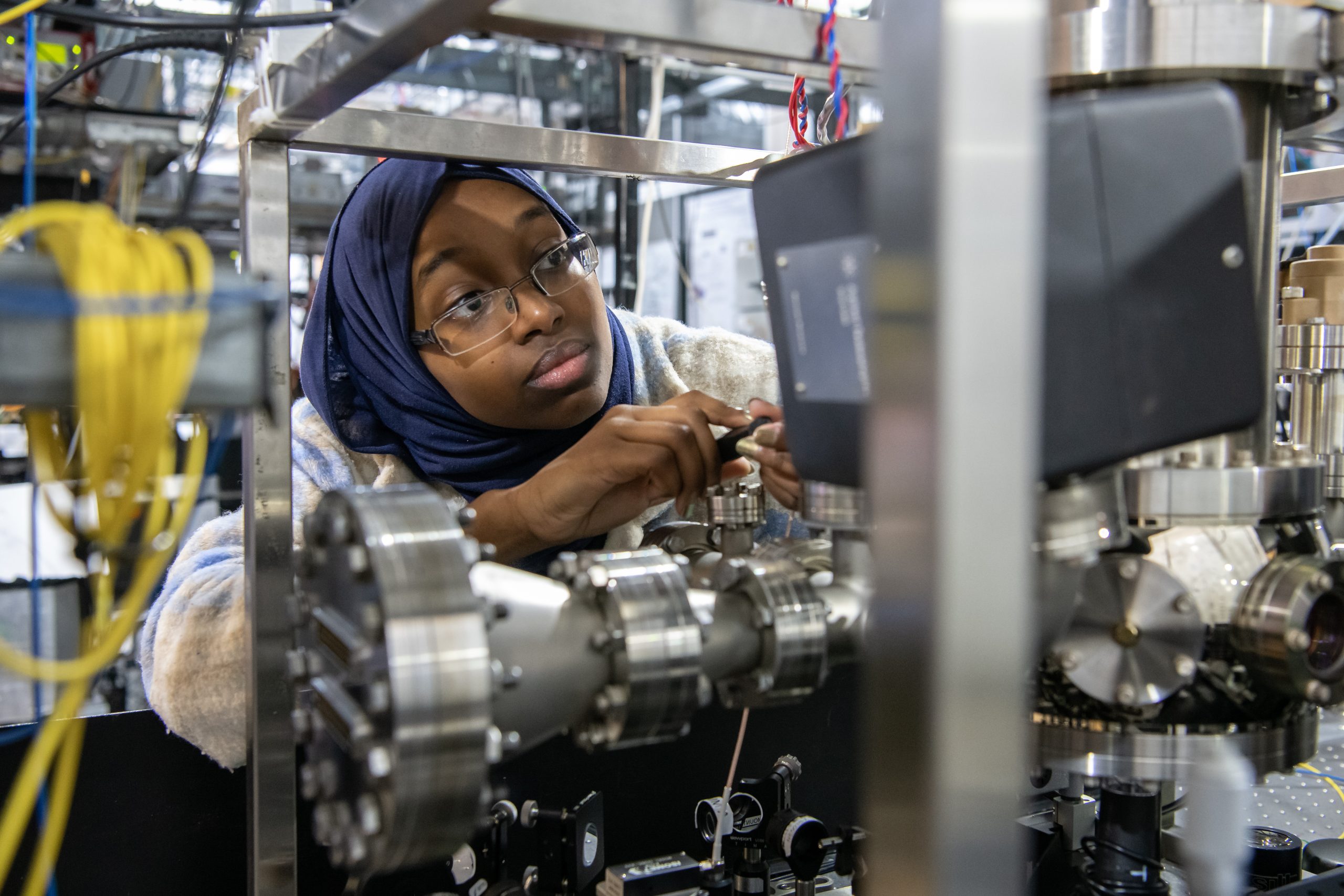Meet our students
Cohort 2
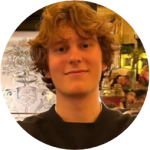
Matthew Dickens
Matt graduated from Imperial College London in 2025 with an MSci in Physics. His thesis focused on designing a compact microwave antenna to drive magnetic dipole transitions in cold 87Rb atoms for a transportable atom-interferometer navigation system. Matt combined MATLAB simulations with experimental prototyping to explore a vacuum-compatible, low-power alternative to conventional microwave horns. The project got him interested in applied quantum technologies and how research can be translated into practical devices. Through the CDT he is looking forward to exploring quantum communication, photonics, and computing, while gaining exposure to industry to understand the route from lab research to deployable quantum technologies. Outside of physics, Matt enjoys playing tennis, running, and music.
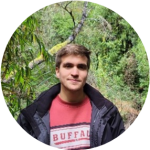
Damián Gimeno
Damián graduated from the Universidad de Santiago de Chile in 2022 with a BSc in Applied Physics. During his final year, he became involved in two areas: quantum information and applied mechanics. After working in thin-film manufacturing at the Thin Structures Laboratory in Chile, he began his MSc in mechanical engineering at the University of Nevada, Reno. He completed his master’s in 2025 after researching stress focusing in thin sheets, with the aim of developing a physical understanding of interactions between developable cones.
Damián’s interest in quantum information stems in part from the knowledge he gained in courses such as quantum optics and physical platforms for quantum computing. He joined the CDT with the goal of acquiring essential experimental skills to conduct research in quantum technologies, both in the lab and in industry.
Outside of academics, Damián enjoys playing music, reading, and engaging in various outdoor activities
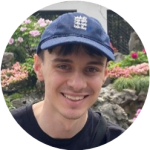
Gareth Hopkins
Gareth graduated from the University of Oxford in 2025 with a Master’s degree in Physics, where he became fascinated by the unintuitive techniques used to harness quantum phenomena. His Master’s project focused on solving the dynamics of open quantum systems using the Hierarchy of Pure States (HOPS) method, investigating its performance across different physical regimes. With a strong theoretical foundation, Gareth is now keen to develop his experimental skills through the CDT, aiming to contribute to scalable quantum computing for real-world applications. Outside of the lab, he enjoys staying active through sports and unwinding through social gaming with friends.
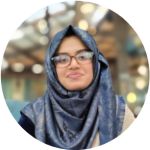
Iqra Imran
Iqra is a passionate theoretical physicist with a growing interest in experimental research. She completed her Master’s in Physics at Lahore University of Management Sciences (LUMS) in 2024, following a Bachelor’s degree in Computational Physics from the University of Punjab. Her Master’s dissertation focused on the particle aspect of Axion Dark Matter, diving deep into the mysteries of one of the most compelling dark matter candidates. Alongside her theoretical work, Iqra also ventured into the world of Quantum Information Science, where she carried out experiments using single-photon emitters and investigated quantum entanglement — blending theory with hands-on research.
Iqra is excited to expand her experimental toolkit and apply her strong theoretical foundation to cutting-edge research in photonics and quantum computing.
Outside the lab, you’ll find her enjoying a game of badminton, trying out new recipes in the kitchen, or planning her next travel venture.
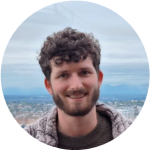
Matthew Jones
Matt graduated from the University of Cambridge in 2022 with an MEng in Electrical and Electronic Engineering – his master’s project being in the field of computer-generated holography. Since graduating he has spent three years working in industry as an RF engineer on a variety of projects related to communications systems. Outside of work he enjoys live music, playing the piano and cooking.
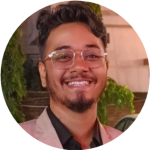
Rajat Lakhera
Rajat earned his Master’s degree in physics from SDS Uttarakhand University, India. The highlight of my academic journey was collaborating with graduate students at IIT Delhi to characterise femtosecond laser pulses using an SHG FROG setup. At Sussex, I aim to pursue research at the intersection of theory and experiment, focusing on quantum computing hardware and sensing. In addition to research, tutoring and sharing knowledge are core passions of his and he looks forward to contributing to the broader quantum community. Having navigated the challenges of entering high-quality research environments from an under-resourced institution, he plans to participate in university-led outreach and mentorship programs to support students following similar academic trajectories. Beyond academics, Rajat enjoys creative pursuits such as singing, playing the piano, and painting. When not immersed in quantum science, he can often be found exploring new landscapes and sketching in his art journal.
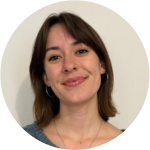
Isabella Martin
Isabella graduated from the University of Southampton with a master’s in electronic engineering. Her bachelor’s project was focused on the design optimisation of a photonic crystal electro-optic modulator, developing her computational design skills and instilling a passion for integrated photonics. During her studies, she gained research experience at the Institute of Quantum Computing in the Quantum Photonic Devices Laboratory. Having attended one of QET Labs’ outreach programs as a teenager, Isabella is particularly excited to return to Bristol. She is looking forward to improving her theoretical background and learning more about the different applications of photonic quantum technology. Outside of the lab, she can be found running, climbing or wild swimming.
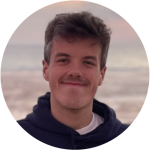
Samuel Millington
Sam graduated from the University of Oxford in 2025 with a Master’s in Physics. His master’s project focused on optimising a device that entangles two remote trapped ions using photonic interactions and entanglement swapping, developing technology that will be able to create large-scale quantum networks. Alongside Quantum Information, Sam specialised in Condensed Matter Physics and is fascinated by the potential applications of semiconductors, superconductors, and other materials for developing quantum systems. Through the CDT, he is excited to expand on what he has learnt and delve deeper into all things QIST, particularly how these technologies can be applied in industry and society. He is also looking forward to engaging in outreach activities and science communication, sharing how captivating quantum science is with wider audiences. Outside of physics, Sam can be found either swimming, playing the trumpet, or at the cinema.
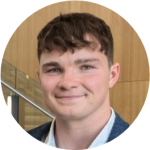
Ruaridh Morgan
Ru graduated from the University of Bristol in 2025 with an MSci in Mathematics. His masters research project was on the theory of continuous variable quantum information, focusing on how this can be applied to quantum key distribution protocols. He is excited to develop his simulation skills and work alongside like minded peers through the CDT, and hopes to use his theoretical background to contribute to the field of quantum information. He has a particular interest in quantum error correction and looks forward to deepening his understanding of the subject throughout his first year. Outside of academia, Ru enjoys cooking and playing rugby
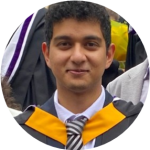
Sayak Mukherjee
Sayak completed his MSci in Physics at Imperial College London in 2024, where his undergraduate dissertation applied machine learning techniques to search for evidence of the hypothetical axion particle within data from the LHCb experiment. He subsequently pursued a Master’s by Research degree, also at Imperial, focusing on the optimal quantum control of the Jaynes–Cummings model. His research involved using Bayesian Optimisation to steer the system towards the generation of non-classical states of light. At the QIST CDT, Sayak is keen to explore the broad spectrum of research opportunities available—from experimental to theoretical quantum science—with a particular interest in advancing his career in the rapidly evolving field of quantum computing. Beyond academics, he enjoys long walks, playing cricket, and chess.
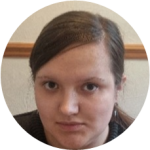
Chloe Reed
Chloe graduated from the University of Strathclyde in 2024 with an MSc in Optical Technologies, following a BSc in Chemical Physics from the University of Glasgow. Her master’s project involved characterising a Digital Micromirror Device (DMD) for use in optical magnetometry, applying compressive sensing techniques to enhance sensitivity while reducing image acquisition times. This experience in quantum optics sparked a strong interest in understanding the principles behind both established and emerging sensing technologies. She is enthusiastic about joining the QIST CDT to explore new methods and applications in quantum sensing. Outside the lab, she enjoys playing Dungeons & Dragons, practising flute, and reading.
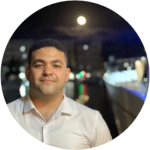
Mohamed Saleh
Mo Saleh received his bachelor’s degree in Communications and Information Engineering from the University of Science and Technology at Zewail City (UST-ZC), Egypt, in June 2024. Since March 2024, Saleh has worked as a research assistant at Zewail City’s Quantum Communications and Cryptography Lab, shifting his focus toward quantum computation and quantum information. There, he built a low-cost faint-pulse single-photon source, essential for quantum communication experiments, and developed a software engine for simulating linear optical setups for efficient quantum computation. Following graduation, he also took on a teaching assistant role at Zewail City. Through this CDT, Saleh aims to acquire the skills needed to pursue a research and development (R&D) career in quantum information science and technology. Beyond academic pursuits, he enjoys video games, vibe coding, reading, and long walks.
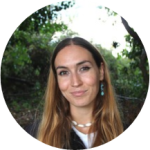
Bethany Squibb
Beth graduated from the University of Bristol in 2024 with a BSc in Physics and Philosophy. Her final-year project explored whether quantum phenomena could be derived from an extended principle of relativity, focusing on superluminal observers and Lorentz symmetry as possible ways of explaining superposition and indeterminacy. Her academic background is rooted in theoretical physics and the philosophy of physics, with particular interests in time, causality, and observer-dependence. Through the CDT, Beth is particularly excited to see how these ideas unfold in experimental settings, to explore the broad applications of quantum technologies, and to contribute to their future development. Outside of academia, she enjoys climbing, running on the Downs, hiking in the mountains, and discovering new live music at festivals.
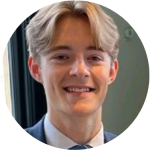
Daniel Travers
Dan graduated from the University of St Andrews in 2025 with a BSc in Maths and Physics. During his undergrad, he completed a summer research project on quantum state sharing – a continuous-variable protocol which uses entangled states of light to distribute encrypted information among multiple parties. In his final year project, Dan coded and evaluated three optimisation algorithms, applying them to the problem of maximising points in Fantasy Football, a favourite hobby of his. His research interests within quantum information science remain broad, but are currently centred on photonic quantum computing and communication. Through the CDT, Dan is eager to explore a variety of research areas and engage with Bristol’s thriving start-up environment. Outside of physics, he enjoys football, poker and playing the guitar.



